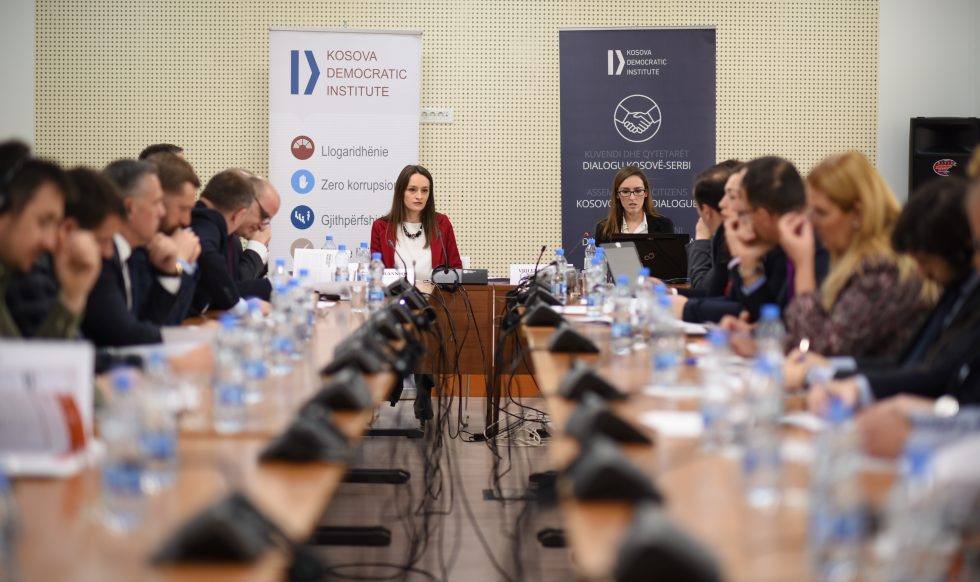


Today, during the round table discussion “How to Make Parliamentary Oversight to Kosovo-Serbia Dialogue more Effective?”, Kosova Democratic Institute (KDI) has published a report on how and to what extent the Kosovo Assembly handled Kosovo-Serbia dialogue during the year 2018. Present at this roundtable were Members of the Assembly of Kosovo and members of civil society.
Violeta Haxholli from KDI, during the presentation of the main findings of this report, stressed that the dialogue issues were dealt more by the Assembly in during the autumn session, while during the spring session the dialogue was discussed mainly within the parliamentary committee meetings.
“The process of dialogue during the first half of the year has been developed at a technical level where the focus of the MPs has been overseeing the implementation of the agreements, and discussions on who should lead this process. In the second half of the year, due to political developments, the focus has been on the topic of ‘border correction’ and the state delegation, which highlighted the divisions between the parliamentary parties, “emphasized Haxholli.
She added that Kosovo Assembly deputies discussed the dialogue on 21 out of 42 sessions held in 2018, in which the most discussed topics were: the idea of border correction, the new phase of dialogue, the negotiating team, the tax 100%, missing persons, and the implementation of the Energy Agreement.
Regarding the parliamentary oversight of the dialogue process, Haxholli stressed that this function was not sufficiently exercised by the deputies, who have submitted only 9 parliamentary questions regarding the dialogue, out of a total of 275 submitted in general, and initiated only one interpellation, out of 12 initiated in general.
In relation to parliamentary debates, as another mechanism for overseeing the dialogue process, she announced that only three parliamentary debates were initiated. Moreover, three resolutions have been adopted, such as the one on normalization of relations between Kosovo and Serbia, on the missing persons and on the funds allocated by the Kosovo Government for electricity spent in the north of the country.
However, Kosovo-Serbia dialogue has directly affected the work and functioning of the Assembly. The various views of the subjects on the future of this process have led to the deepening of the divisions between the position and the opposition. This was followed by installing boycott practices and preventing the quorum needed for the work of the Assembly.
Talking about the work of parliamentary committees in relation to the dialogue process, Haxholli announced that the topics related to the dialogue were raised to 10% of the meetings held by parliamentary committees. The most discussed topics were: the implementation of the agreements so far, the lobbying of Serbia against Kosovo, the visits of Serbian officials to Kosovo and the fate of missing persons.
She added that “The three parliamentary committees that have discussed most about the dialogue are: the Committee on Foreign Affairs, Diaspora and Strategic Investment, the Committee on Economic Development, Infrastructure, Trade, Industry and Regional Development, and the Committee on Human Rights, Gender Equality , for Missing Persons and Petitions.
The work of the Assembly for 2018 was concluded with the adoption of the Resolution on the dialogue process on the normalization of relations between Kosovo and Serbia on December 15 which was voted by 59 deputies, unlike the citizens’ expectations for a broad political delegation from the KDI polls.
On the other hand, the deputies present from the position and the opposition estimated that the Assembly played a relatively good role in dealing with the issue of dialogue. They stressed the need to reach a consensus on the political spectrum regarding the issue of dialogue and agreed that the Assembly should continue to play its supervisory role in the new phase of the dialogue.
The report along with full findings and recommendations can be downloaded here.
This meeting was realized within the project “European Perspective – Building a National Consensus on the Normalization of Relations with Serbia” supported by the Swiss Embassy in Pristina.